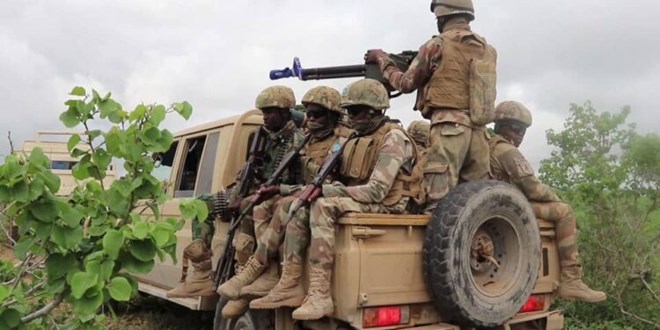
Sunday August 18, 2024

FILE Somali National Army (SNA) soldiers patrol a recaptured area in southern Somalia, following a successful operation against al-Shabaab militants.
Mogadishu (HOL) — Somali government forces have secured key strategic villages in central and southern Somalia from al-Shabaab militants, marking progress in the country's ongoing counter-insurgency campaign. However, the tactical retreats by al-Shabaab have sparked concerns about potential counterattacks as the conflict in these regions continues to escalate.
In recent weeks, the Somali National Army (SNA), supported by regional forces and allied clan militias, successfully recaptured the villages of Run-nirgod in Middle Shabelle and Bula Haji in Lower Juba. These areas had long served as important command centers for al-Shabaab, enabling the group to coordinate attacks and maintain control over vast swathes of territory.
Military experts note that al-Shabaab's decision to withdraw from these areas with minimal resistance could be a strategic maneuver. The group has historically employed tactical retreats to regroup and launch surprise counterattacks. This pattern, observed in previous conflicts, suggests that while the government's gains are notable, they may precede renewed militant activity.
On June 8, al-Shabaab militants attacked military bases in the El Dheer district of Galgaduud, using vehicle-borne improvised explosive devices (IEDs) and rocket-propelled grenades (RPGs) to initiate the assault. The militants claimed to have killed more than 60 soldiers during the attack, though these figures could not be independently verified.
For the residents of these conflict zones, the shifting control of territory has brought a mix of relief and apprehension. While the presence of government forces has improved security, the fear of retaliatory attacks by al-Shabaab remains a constant threat. The conflict has also exacerbated humanitarian challenges, with displacement, food shortages, and limited access to basic services becoming more prevalent.
In Run-nirgod, local relief organizations have reported an increase in displaced families, many of whom have been forced to flee multiple times due to ongoing violence. These families face dire conditions, with inadequate access to food, shelter, and healthcare.
"The humanitarian situation in these areas is dire," said Amina Abdullahi, a volunteer with an NGO in Middle Shabelle. "We're seeing more families in desperate need of assistance, but reaching them is increasingly difficult due to the security situation."
The recent military successes have bolstered the Somali government's position in its fight against al-Shabaab, yet they also present new challenges. The reliance on clan militias to achieve these victories has sparked concerns about the long-term stability of the liberated areas and the potential for inter-clan conflicts.
President Hassan Sheikh Mohamud, who has prioritized the fight against al-Shabaab, has called for continued international support for Somalia's counter-insurgency efforts. However, the government's ability to control newly liberated areas and provide governance will be critical tests of its authority.
Since the launch of the counter-insurgency operation in August 2022, the federal government has focused on dislodging militants from central Somalia.